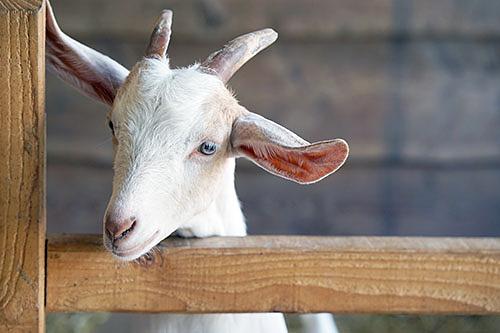Basics of Meat Goat Management
Sep 26, 2022

Meat goats are a growing livestock enterprise in many parts of the United States today. It is important to understand key aspects of meat goat management when deciding to get into the business. We will discuss nutrition, breeding, health, and other management concerns in this week’s blog.
Feeding Your Herd
Mature does and males do well on normal pasture; however, they do require three to four pounds of hay or forage on a daily basis. If pasture access is a concern, it is critical to provide adequate hay or forage of some kind. A grain-based supplement might be required as well during periods of high production, especially in your does (flushing, gestation, lactation, etc.). The amount of grain supplementation varies based on forage quality and availability. Meat or market goats should be fed on a grain ration that runs between 14% and 18% protein. Be sure to check the body condition of the animal to ensure proper feeding tactics. Key areas to observe are the shoulders, tail head, pins, edge of loin, and the backbone. If a noticeable change occurs, contact your local veterinarian for further evaluation.
As always, have clean water and shade available for your herd at all times.
Raising the Kids
It is important that kid goats receive colostrum (the first milk) as soon as possible after birth, preferably within the first few hours. The kid’s ability to adequately absorb colostrum decreases rapidly during the first 48 hours of life. Colostrum provides antibodies for resistance to disease and is high in nutrients, including energy, vitamin A, B vitamins, protein, and minerals. If the dam has multiple kids, make sure all kids receive the colostrum after birth.
As kids progress in age by a few days, keep them in a warm, dry area and ensure they receive adequate milk from their mother or from a commercial milk replacer if needing to be bottle-fed.
After about four weeks, the introduction of hay and feed can be administered. A creep feeder for the grain is a must in this transitioning period. Once the kids have grown accustomed to eating whole foods, they can be weaned off milk. At this time, it is wise to start vaccinating and deworming your goat kid herd as well.
These are just a few basic practices that can enhance your start-up or long-term participation in the meat goat industry. Stay in contact with your local veterinarian if concerns or questions arise. Your local Co-op is a great resource for all things small ruminant. Find more content like this in this month’s issue of The Cooperator.
Feeding Your Herd
Mature does and males do well on normal pasture; however, they do require three to four pounds of hay or forage on a daily basis. If pasture access is a concern, it is critical to provide adequate hay or forage of some kind. A grain-based supplement might be required as well during periods of high production, especially in your does (flushing, gestation, lactation, etc.). The amount of grain supplementation varies based on forage quality and availability. Meat or market goats should be fed on a grain ration that runs between 14% and 18% protein. Be sure to check the body condition of the animal to ensure proper feeding tactics. Key areas to observe are the shoulders, tail head, pins, edge of loin, and the backbone. If a noticeable change occurs, contact your local veterinarian for further evaluation.
As always, have clean water and shade available for your herd at all times.
Raising the Kids
It is important that kid goats receive colostrum (the first milk) as soon as possible after birth, preferably within the first few hours. The kid’s ability to adequately absorb colostrum decreases rapidly during the first 48 hours of life. Colostrum provides antibodies for resistance to disease and is high in nutrients, including energy, vitamin A, B vitamins, protein, and minerals. If the dam has multiple kids, make sure all kids receive the colostrum after birth.
As kids progress in age by a few days, keep them in a warm, dry area and ensure they receive adequate milk from their mother or from a commercial milk replacer if needing to be bottle-fed.
After about four weeks, the introduction of hay and feed can be administered. A creep feeder for the grain is a must in this transitioning period. Once the kids have grown accustomed to eating whole foods, they can be weaned off milk. At this time, it is wise to start vaccinating and deworming your goat kid herd as well.
These are just a few basic practices that can enhance your start-up or long-term participation in the meat goat industry. Stay in contact with your local veterinarian if concerns or questions arise. Your local Co-op is a great resource for all things small ruminant. Find more content like this in this month’s issue of The Cooperator.